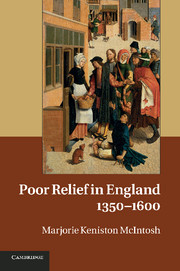Book contents
- Frontmatter
- Contents
- Acknowledgements
- Notes on conventions and online resources
- Abbreviations
- 1 Introduction
- Part I Late medieval and early Tudor patterns
- Part II Profound change during the early Reformation period
- Part III Intensified problems and altered approaches in the later sixteenth century
- Part IV Responding to the problems
- 9 The Poor Laws of 1598 and 1601
- 10 Conclusion
- Appendices included in the printed volume
10 - Conclusion
Published online by Cambridge University Press: 05 January 2012
- Frontmatter
- Contents
- Acknowledgements
- Notes on conventions and online resources
- Abbreviations
- 1 Introduction
- Part I Late medieval and early Tudor patterns
- Part II Profound change during the early Reformation period
- Part III Intensified problems and altered approaches in the later sixteenth century
- Part IV Responding to the problems
- 9 The Poor Laws of 1598 and 1601
- 10 Conclusion
- Appendices included in the printed volume
Summary
This study has shown how religious and social thought joined with changes in the demographic and economic environment and with emerging political practices to shape attitudes, policies, and behavior concerning the poor between 1350 and 1600. The nature and extent of poverty shifted over time in accordance with the size and mobility of the population and particular economic conditions. During the later medieval years, when the proportion of needy people was comparatively small, alms gathering was facilitated by Catholic views about charity and a belief in indulgences. Hospitals and almshouses provided shelter for several thousand others, and some parishes distributed occasional aid. These forms of assistance supplemented the mutual help provided by the poor themselves, among friends, relatives, and neighbors.
Beginning around 1530, a rise in the number and visibility of poor people, especially in urban areas, created new concern. A combination of humanist and early Protestant idealism during the 1530s, 1540s, and early 1550s led to critiques of existing provisions for the poor, helped to justify the dismantling of earlier forms of church-run assistance, and led to the initiation of a system of parish-based poor relief. That early experimentation was made possible by cooperation between the crown, Privy Council, and leaders of the national church and by the interest and energy of Parliament, which was becoming more actively involved in many areas of legislation.
- Type
- Chapter
- Information
- Poor Relief in England, 1350–1600 , pp. 294 - 298Publisher: Cambridge University PressPrint publication year: 2011



